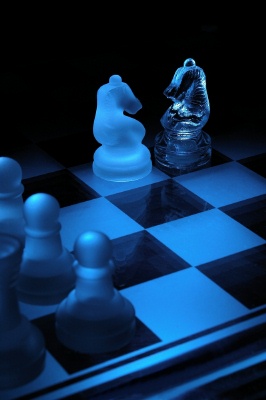|
 "It's
a poor sort of memory that only works backwards." "It's
a poor sort of memory that only works backwards."
-- The White Queen
A lot of poker players who think they play well actually approach some of the critical, fundamental aspects of the game completely backwards.
One example is how many players approach
one-table satellite tournaments. They seem to think
they can win their tables in the first half hour, when there are still eight or nine players left! They set out to accumulate a lot of chips,
but this is pointless as the increase in chips in this situation is of trivial value as the blinds and antes go up. The key to winning these
"mini-tournaments" is primarily to be there when it matters, and it seldom matters before you get down to four people. At this point,
now you must play aggressively, without the fear of being eliminated. You can't play conservatively because the blinds are moving around quickly,
there aren't that many chips in play, and your opponents with smaller amounts of chips are forced to be aggressive. In other words, on those rare
occasions where you would have won five times your share of the pots early,
all that gives you is the ability to lose one pot later in a satellite.
Put another way, what would you prefer (with the same money at stake): to sit down in a ten handed satellite and get 300 in chips, or
to somehow be able to sit down with 300 and one opponent with 2700? If you are any kind of player, you want to be there at the end.
You win four hands now, and you should win the satellite. Even more obviously, if you haven't been eliminated, you can
make a deal. If you are busted out, you can't.
Simply not being eliminated it the key to making money in satellites.
Texas Holdem starting hands. A common
fixation amongst a certain type of player is what percentage of the flops a player should see when playing Holdem, and a rigid
fixation on starting hand requirements. While guideposts can be comforting to people in any sort of human endeavor, in this case
it is seeking comfort from a few raindrops while a hurricane is swirling around you. Think of one of those people who asks about
seeing-the-flop percentage and then imagine asking them: "What percentage of the time do you call on the turn?" Or,
"what percentage of the time do you bluff-raise on the river?"
Imagine now the sight of their eyes glazing over.
They give zero thought to those percentages. But Texas Holdem is a post-flop game. The key decision-making and tactical maneuvers take place
after the flop. What starting hands you play should be determined by how you play after the flop, not the other way around. Skillful
Holdem is all about betting. Bluffing, semi-bluffing, value betting,
getting free cards, saving bets, raising with draws against multiple players, betting or raising second pair when good but checking or
folding when it is no good, etc. etc. None of this has much of anything to do
with starting hands. People who spend most of their time focusing on starting hands in Holdem are misusing their time and approaching the game backwards.
Omaha HiLo starting hands. A common philosophy amongst Omaha players is to try and see many flops
cheaply because "anything can win".
But Omaha is very much a pre-flop game. Post-flop Omaha is less multi-dimensional than Texas Holdem. You want hands that can
drive the betting. You want hands where most of the time it is plainly clear what to do. In contrast to Texas Holdem, where key tactical
post-flop decisions are critical and difficult to figure out, post-flop Omaha
tactics are often as straightforward as possible.
Obviously this isn't always the case, but if you are playing correctly you will often either have nothing or a bettable nut hand or
nut draw. Most of the time there is less finesse, it just comes down to driving the betting (or rope-a-dope calling someone who would
fold if you bet or raise), or merely folding. Occasionally their are times of great finesse, even greater finesse than Holdem, but
these are not common and your play should not be based around them.
It's actually pretty funny to think about how a large group of players manage to reverse the fundamentals of these two games. If a lot
of people would simply play Holdem like they play Omaha and play Omaha like they play Holdem, they would instantly become better players!
Also: Poker Decision-making,
Making Choices,
Poker Anti-skills and
Losing Poker |

